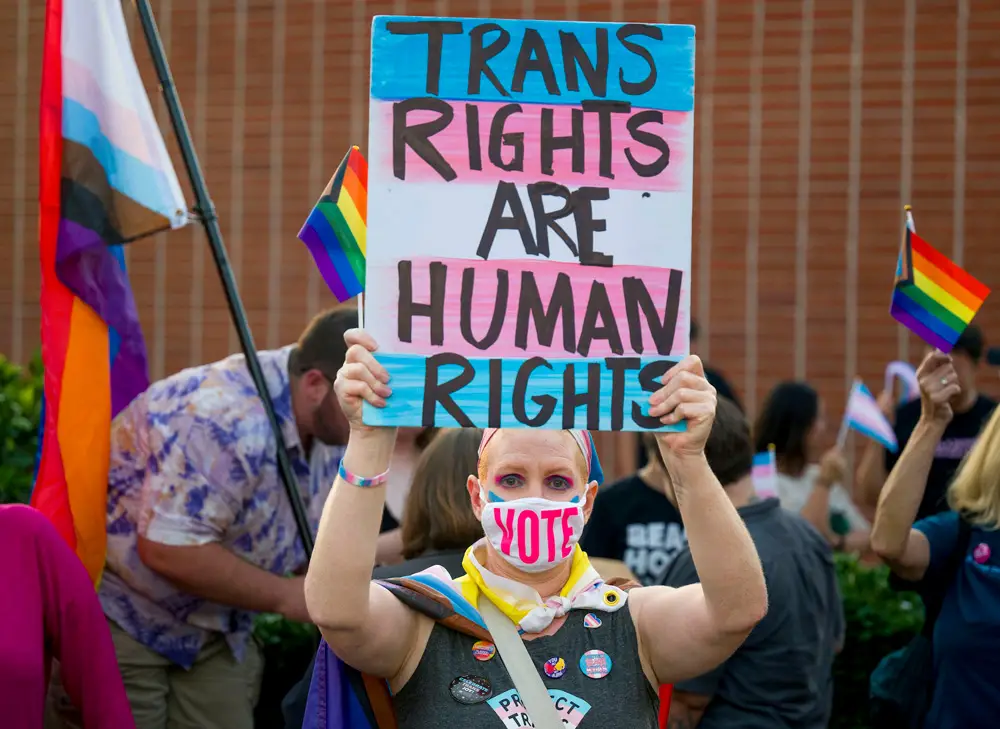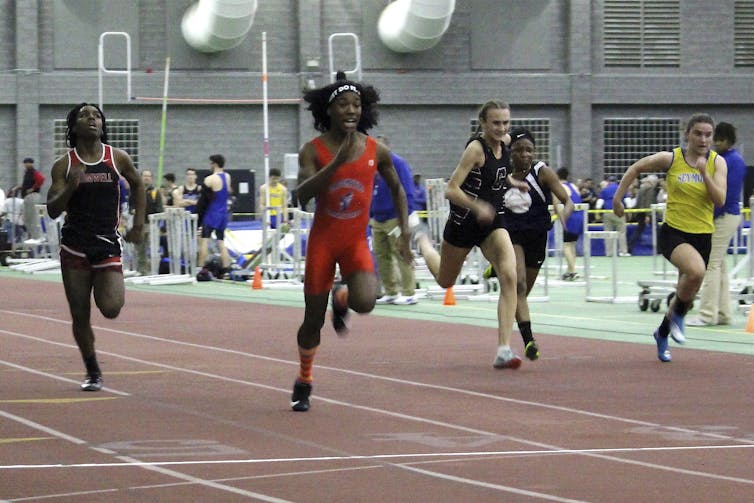
By George B. Cunningham and Kelsey Garrison
In 2023, 24 states had laws or regulations in place prohibiting transgender students from participating on public school athletic teams consistent with their gender identity. These bans mean that a person whose sex assigned at birth was male but who identifies as a girl or woman cannot play on a girls or women’s athletic team at a public school in that state.
The topic has spurred many debates about fairness, the science behind sports performance, civil rights and sports as a human right.
As researchers who study diversity, equity and inclusion in sport, we were interested in understanding what prompted such bans. Though not a surprise, we showed for the first time through an in-depth study set to be published in the peer-reviewed Journal of Sport Management that state-level politics and public biases against transgender people are largely to blame.
Our research
We collected two years of data in 2021 and 2022 on states that passed legislation prohibiting transgender athletes from participating in sports on teams that connect with their own gender identities.
To determine the political leanings of a state’s population, we collected data about the share of Republican state senators and the party affiliation of the governor.
Finally, we collected information about the biases people had toward transgender individuals. The data came from responses to the Project Implicit website. People visiting the site can take tests aimed at measuring their biases toward different groups, including transgender people. Administrators then remove identifying information and make the data freely available. For our study, we aggregated the responses to have transgender bias scores for each state.
The politics of transgender bans
States whose residents have conservative political leanings tend to have more restrictive views on civil rights issues such as immigration, health care and the use of the death penalty.
These patterns hold for transgender rights, too.
In our work, we found that states with conservative-leaning legislatures such as in Wyoming and West Virginia were most likely to enact transgender athlete bans. As were states with Republican governors, such as Ron DeSantis in Florida and Greg Abbott in Texas.
These statewide patterns are consistent with national political actions.
In 2023, the Biden administration proposed a change to Title IX, the federal law that bans sex discrimination at K-12 schools and colleges that receive federal funds. Under Biden’s proposed changes, Title IX would also ban discrimination based on sexual orientation and gender identity.
In response, nearly all – 25 of the 26 Republican governors – called on Biden to delay or withdraw the rule change. To date, Biden has not made a final decision and has delayed the change.
Bias against transgender people
But politics tells only part of the story.
We found that conservative political leanings spurred collective biases against transgender people, which in turn prompted the bans.
Political scientists have previously shown that politicians craft narratives and frame their arguments in ways that help shape people’s attitudes about social issues. In fact, people will sometimes adjust their perspectives to align with those held by their political representatives.
That’s what we found.
Impact on sports and athletes
Biases that are prevalent in a community or state represent systemic forms of oppression. Coupled with laws that limit rights, collective biases serve to stigmatize transgender people, hurting their overall health and well-being.
The impact is far-reaching.
Transgender athletes face the real possibility of participating in a sport one day, only to be prohibited from doing so the next. Ending a career in sports, regardless at what age, can harm the mental health of some athletes, something only likely to be magnified given the reason for the end.

AP Photo/Pat Eaton-Robb
Coaches and sport administrators living in conservative states might find themselves having to navigate laws affecting who can play on their teams. They can do so by partnering with campus counselors and ensuring their athletic departments are inclusive spaces.
What’s next?
The links among conservative politics, collective biases against transgender people and transgender rights are unlikely to diminish any time soon. National political reporters Adam Nagourney and Jeremy Peter explained that social conservatives have targeted transgender rights as a way of galvanizing their constituents. The GOP efforts came about after planning by national conservative organizations to “harness the emotion around gender politics.”
Proponents of transgender inclusion have offered counterarguments, showing that transgender athletes are not a threat to women’s sports, nor have they ever been.
This data is important but will go only so far when combating biases.
Education and the chance to be around transgender people in everyday life also help curb prejudice. These collective factors, when combined with compelling stories about transgender inclusion in sports, may be what’s needed to overcome the biases in place.
![]()
George B. Cunningham is UAA Endowed Professor of Sport Management at the University of Florida. Kelsey Garrison is a doctoral student at the Department of Sports Management at the University of Florida.






























Endless dark money says
Republicans hate people and freedom it’s inconvenient to their corporate overlords.
jake says
This has nothing to do with “republicans”. Males don’t belong competing with females, in sports. The board room is a different place, where females may exceed.
TRt says
I agree Jake, But the left always want to blame the right for anything that is good and want to turn it into something bad because they didn’t think about it first.
The male body is designed different internally and externally. Buy internally I mean the mussels develop different because of different hormones so they are stronger then a woman’s. Just like a woman can give birth to a baby and a man can not. Externally just look in the mirror, LOL
Sexuality at birth is the way it should be and NO ONE should change that. EVER.
Dennis C Rathsam says
If transgender kids want to play sports, they should play by the same rules as everyone else has since the beginning of time. If you were born a man, you cant compete against girls. Men are much stronger than ladies, everyone knows this. Its not fair to female sports, its called cheating! Look at all the girls that were hurt, while competing against men. Its just not right. I maybe old school, but Im not nuts!
Marc Crane says
It should be every state. It’s biased to allow a man to compete against women and just common sense not to allow it to happen.
Flamingo Gary says
I totally agree that transvestites are people too and should be treated with the same respect as anyone else. If they aren’t hurting anyone else with their dressing up it should’nt be anyone’s business but theirs.
Rose Marie says
If you want to identify as a female, male or a chicken, that’s fine. You have that right in this country. As a whole, we are a tolerant nation. But stop trying to sell the idea that transgender athletes should be competing in women’s sports. Unless their DNA has been changed to female, this isn’t a fair competition.
And it will never be acceptable as such.
That has absolutely nothing to do with politics.